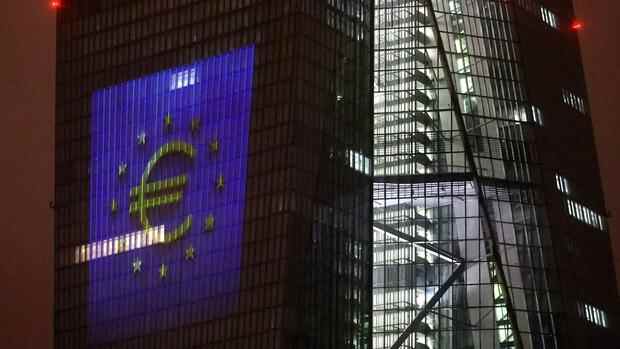The ECB’s decision to turn around interest rates has met with a great deal of criticism.
(Photo: Reuters)
Dusseldorf, Berlin Criticism of the European Central Bank’s (ECB) speed with the planned interest rate hikes comes from the German economy and from top economists. “Too little and too late,” Dirk Jandura, President of the German Wholesale, Foreign Trade and Services Association (BGA), told the Reuters news agency on Thursday about the announced turnaround in interest rates. “This schedule is still too hesitant,” said the chief executive of the banking association, Christian Ossig.
The head of the ifo Institute, Clemens Fuest, also said: “The interest rate decision by the European Central Bank is a step in the right direction, but it comes too late. It was unacceptable that the ECB stuck to negative interest rates and bond purchases with inflation at eight percent.”
>> Read also: Reasonable ECB President Lagarde at her press conference the decisions of the central bank
The price increases do not only affect energy and food, Fuest explained. “You gain breadth.”
Top jobs of the day
Find the best jobs now and
be notified by email.
The ECB had previously signaled the first rate hike in eleven years for July, but this should be small at 0.25 percentage points. This is to be followed up in September – possibly with a stronger increase.
“Instead of the necessary, clear and rapid interest rate hike, the ECB continues to lag behind interest rate developments,” said Jandura. “The ECB’s hesitant decision is damaging the euro.”
“The fundamentally changed price environment no longer justifies a negative key interest rate until autumn,” said Ossig, referring to the deposit rate of currently minus 0.5 percent that banks have to pay for money parked at the ECB. This would remain in negative territory at least until September.
The ECB should therefore end its negative interest rate policy in July and thus before the summer break with an increase of half a percentage point in one step. “That would be a clear and urgently needed signal to consumers, companies and collective bargaining parties,” said Ossig.
Stefan Kooths, Vice President of the Kiel Institute for the World Economy (IfW), said the steps announced by the ECB are a long overdue start, “but only that”. She urgently needs to take further steps to normalize monetary policy because her credibility is at stake.
Her main mission is monetary stability, and that’s what she should focus on now, Kooths explained. “If the impression is strengthened that it is being driven primarily by the needs of the financial policy in some euro countries, the expectation of further rising inflation threatens to take on a life of its own.”
Volker Brühl, Professor of Banking and Finance and Managing Director at the Center for Financial Studies at the Goethe University in Frankfurt, speaks of a “disappointment”. The ECB’s announcement falls short, he writes on Twitter.
Criticism also comes from family businesses. “Due to its complete misjudgment of inflation, the ECB is now being driven by itself and must now send a clear signal that it still takes price stability seriously,” said Managing Director Albrecht von der Hagen. “There can be no talk of a cleverly initiated turnaround in monetary policy.”
The ECB has long since lost sight of its actual task – to ensure stable prices. The flood of money from the ECB is considered one of the main drivers of core inflation. “The costs for citizens and companies are already irresponsibly high,” said von der Hagen.
There can be no talk of a cleverly initiated turnaround in monetary policy. Albrecht von der Hagen, general manager at Die Familienunternehmer eV
Overall, the decision goes in the right direction for the Association of German Chambers of Industry and Commerce (DIHK). With its actions, the ECB cannot completely capture the imported inflation drivers in the form of the dramatically increased energy and commodity prices.
“However, without an interest rate turnaround, the euro would become even weaker against the dollar,” said DIHK foreign trade chief Volker Treier. “Then imported energy would become even more expensive than it already is.”
Overall, the ECB is not faced with an easy task. “From the point of view of the economy, it is important to tackle the expectation of persistent inflation with a moderate increase in interest rates and to prevent a wage-price spiral,” said the DIHK expert. However, the economic signals are currently so negative that the scope for interest rate hikes is limited.
More: ECB decision – Can the southern countries cope with higher interest rates at all?
